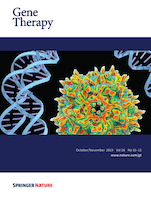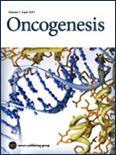
CANCER GENE THERAPY
Scope & Guideline
Advancing the Frontier of Cancer Treatment
Introduction
Aims and Scopes
- Gene Therapy Innovations:
Focus on the development and application of various gene therapy techniques, including oncolytic viruses, CAR-T cell therapies, and RNA-based therapeutics. - Molecular Mechanisms and Pathways:
In-depth exploration of the molecular pathways involved in cancer progression, treatment resistance, and the role of genetic modifications. - Tumor Microenvironment Interactions:
Investigation of how the tumor microenvironment influences cancer progression and response to therapies, including the role of extracellular vesicles and immune cells. - Biomarker Discovery and Validation:
Identification and validation of biomarkers for cancer diagnosis, prognosis, and therapeutic response, facilitating personalized medicine approaches. - Translational Research:
Emphasis on translating laboratory findings into clinical applications, including clinical trials of gene therapy techniques and their effectiveness in cancer treatment.
Trending and Emerging
- RNA Modifications and Non-coding RNAs:
Emerging studies highlight the roles of RNA modifications (e.g., m6A) and non-coding RNAs (e.g., circRNAs, lncRNAs) in cancer biology, signaling pathways, and potential therapeutic targets. - Immunotherapy and Tumor Microenvironment Modulation:
Increased focus on immunotherapy strategies, including CAR-T cell therapies and immune checkpoint inhibitors, as well as the role of the tumor microenvironment in modulating immune responses. - Synthetic Lethality Approaches:
Research on synthetic lethality is gaining attention, particularly in the context of targeting specific genetic vulnerabilities in cancer cells, offering new therapeutic strategies. - Targeted Therapy Combinations:
A notable trend towards investigating the efficacy of combination therapies that target multiple pathways or mechanisms simultaneously to overcome resistance and improve patient outcomes. - Personalized and Precision Medicine:
Research is increasingly oriented towards personalized medicine, emphasizing the need for tailored therapies based on individual genomic and molecular profiles.
Declining or Waning
- Traditional Chemotherapy Approaches:
Research related to conventional chemotherapy is less frequently addressed, as the field shifts towards targeted therapies and personalized medicine. - Basic Cancer Biology without Therapeutic Focus:
Studies focusing solely on basic cancer biology without implications for therapeutic development are becoming less prominent in favor of research with direct clinical applications. - Single-Agent Therapies:
There is a waning interest in studies evaluating single-agent therapies, as combination therapies and multi-targeted approaches are increasingly favored. - Epidemiological Studies:
Epidemiological research related to cancer incidence and prevalence is less frequently published, with a greater emphasis on mechanistic and therapeutic studies.
Similar Journals

GENE THERAPY
Catalyzing Change in Genetic Disorder TreatmentsGENE THERAPY, published by SpringerNature, is a prestigious academic journal at the forefront of research in the fields of genetics, molecular biology, and molecular medicine. Since its inception in 1994, this journal has evolved into a vital resource for scholars, practitioners, and students, providing cutting-edge insights into gene therapy techniques and innovations. With an impressive impact factor reflecting its significant influence— ranking in the Q1 quartile across multiple categories in 2023—GENE THERAPY offers rigorous peer-reviewed articles that address both basic and applied aspects of gene therapy. The journal is recognized for its role in promoting advancements in therapeutic strategies, thus enhancing understanding of genetic disorders and treatment efficacy. Researchers will find this journal invaluable for publishing their findings, staying updated on the latest breakthroughs, and fostering interdisciplinary collaborations. Engage with the latest in gene therapy by accessing this influential platform, and contribute to a field that holds the potential to transform healthcare outcomes worldwide.

Cancer Drug Resistance
Transforming Oncology: Tackling Drug Resistance Head-On.Cancer Drug Resistance is a premier journal published by OAE PUBLISHING INC, focusing on the critical field of oncology and pharmacology. Since its inception in 2018, the journal has been at the forefront of presenting innovative research aimed at understanding and overcoming drug resistance in cancer therapy. With an impressive impact factor reflected in its Q2 ranking in Cancer Research and a Q1 ranking in Pharmacology (medical) for 2023, Cancer Drug Resistance serves as a vital resource for researchers, clinicians, and students who are dedicated to advancing cancer treatment and improving patient outcomes. The journal's commitment to disseminating high-quality, peer-reviewed articles underscores its importance within the academic and medical communities. While it operates on an open-access model, facilitating widespread distribution and access to crucial research findings, the journal continuously strives to foster dialogue and collaboration among stakeholders in cancer research and pharmacology. Its mission is clear: to shine a light on the evolving challenges and breakthroughs in drug resistance, paving the way for enhanced therapeutic strategies and clinical solutions.

Cold Spring Harbor Perspectives in Medicine
Illuminating the Path of Medical DiscoveryCold Spring Harbor Perspectives in Medicine is a premier academic journal published by the esteemed COLD SPRING HARBOR LAB PRESS that has become a crucial resource in the fields of Biochemistry, Genetics, and Medicine. With an impressive impact factor and consistently ranked in the Q1 quartile for both biochemistry and general medicine—as evidenced by its Scopus rankings of #21 and #26 respectively—this journal serves as an essential platform for disseminating high-quality research and comprehensive reviews from leading experts. Covering a convergence of knowledge spanning from 2011 through 2024, it plays a vital role in advancing the understanding of medical science. Researchers, professionals, and students alike benefit from Cold Spring Harbor Perspectives in Medicine, which offers a depth of insight into critical topics, emerging trends, and essential developments within the medical community. Join the conversation and contribute to the ongoing dialogue that drives innovation and excellence in medical research.

MOLECULAR MEDICINE
Unlocking Innovations in Clinical ApplicationsMOLECULAR MEDICINE, published by SPRINGER, is a leading scholarly journal dedicated to advancing the fields of genetics and molecular biology with a focus on clinical applications. Since its inception in 1994, it has evolved to become a pivotal platform for disseminating innovative research findings, achieving a remarkable Q1 ranking in multiple categories, including Genetics, Molecular Biology, and Molecular Medicine as of 2023. Featuring an Open Access model since 2000, the journal ensures that cutting-edge research is freely available to the global scientific community, facilitating collaboration and knowledge exchange. With a commitment to high-quality peer-reviewed content, MOLECULAR MEDICINE serves as an essential resource for researchers, healthcare professionals, and students seeking to stay at the forefront of molecular research and its implications for medical science. For those interested in contributing to or accessing vital research in this dynamic field, MOLECULAR MEDICINE stands out as a premier choice.

INTERNATIONAL JOURNAL OF ONCOLOGY
Connecting researchers and clinicians in the fight against cancer.INTERNATIONAL JOURNAL OF ONCOLOGY is a leading academic publication dedicated to advancing the field of cancer research and treatment. Published by SPANDIDOS PUBL LTD in Greece, this journal, with ISSN 1019-6439 and E-ISSN 1791-2423, has established itself as a reputable source of peer-reviewed articles since its inception in 1993. With an impressive Q2 ranking in both Cancer Research and Oncology categories, as well as high Scopus ranks reflecting its significant contribution to the fields of Medicine and Biochemistry, the journal offers a platform for researchers, clinicians, and students alike to disseminate their findings and engage in dialogue surrounding innovative practices and breakthroughs. Although the journal follows a traditional subscription model, it continues to attract a diverse readership interested in the latest developments in oncological research, providing essential insights into cancer biology, therapeutics, and patient care. With a commitment to excellence, the INTERNATIONAL JOURNAL OF ONCOLOGY plays a vital role in shaping the future of oncology research and is a must-read for anyone passionate about advancing cancer treatment and prevention.

INTERNATIONAL JOURNAL OF HUMAN GENETICS
Exploring the Depths of Genetic KnowledgeINTERNATIONAL JOURNAL OF HUMAN GENETICS is a distinguished publication dedicated to advancing knowledge in the fields of genetics and molecular biology. Published by KAMLA-RAJ ENTERPRISES, this journal explores critical developments and research findings from 2008 to 2016, though its coverage in Scopus has since been discontinued. With an ISSN of 0972-3757 and an E-ISSN of 2456-6330, the journal aimed to foster scholarly dialogue and serve as a resource for researchers, professionals, and students engaged in human genetics. While the journal holds a modest ranking in categories such as Biochemistry and Genetics, it remains a vital source for exploring niche topics within the realm of human genetics. Researchers interested in genetic screening, gene therapy, and clinical genetics will find valuable insights herein. Despite its pause in indexing, the journal continues to contribute to the academic discourse by disseminating critical research that bridges gaps in understanding human genetics.

Advances in Cancer Biology-Metastasis
Fostering Collaboration for Cancer Breakthroughs.Advances in Cancer Biology-Metastasis is an emerging journal published by Elsevier, aimed at advancing our understanding of the complexities of cancer biology, with a specific focus on the mechanisms and pathways related to metastasis. With an E-ISSN of 2667-3940, this journal offers a platform for researchers, professionals, and students in the fields of Cancer Research and Cell Biology to disseminate innovative findings and discuss novel therapeutic approaches. Though currently classified in the Q4 quartile across both Cancer Research and Cell Biology categories, the journal aspires to enhance its impact through rigorous peer review and high-quality publication. Positioned to cover the years from 2021 to 2024, it seeks to bridge gaps in foundational knowledge and promote collaborative research efforts that could pivot the current understanding of cancer metastasis. Researchers are encouraged to take advantage of this platform to advocate for advancements in cancer biology, making significant contributions that can influence both academic and clinical practices.

Cancer Biomarkers
Uncovering the Future of Cancer Detection.Cancer Biomarkers is a leading journal in the field of cancer research, aimed at the exploration and identification of novel biomarkers for cancer detection, prognosis, and therapy. Published by IOS PRESS in the Netherlands, this journal serves as a pivotal resource for those engaged in oncology, genetics, and molecular biology, facilitating access to cutting-edge research and advancements within these disciplines. In its ongoing mission since 2005, the journal has become an essential reference point, currently occupying a Q3 category in Cancer Research, Genetics, and Oncology, and a Q2 category in miscellaneous Medicine fields. With its commitment to high-quality peer-reviewed articles, Cancer Biomarkers satisfies the intellectual appetite of researchers, clinicians, and students alike, contributing significantly to the ever-evolving landscape of cancer biomarker discovery and application. Though currently not available as Open Access, the journal maintains a robust presence in academic circles, underscored by respectable Scopus rankings across relevant categories.

Oncogenesis
Innovating insights into the biology of cancer.Oncogenesis is a prestigious open access journal, published by SpringerNature, dedicated to advancing our understanding of cancer biology and molecular mechanisms of oncogenesis. Since its inception in 2012, this journal has quickly established itself as a leading platform for innovative research, being ranked in the Q1 quartile in both Cancer Research and Molecular Biology categories for 2023. With an admirable impact factor that reflects its exceptional quality, Oncogenesis is indexed in Scopus, holding notable rankings in both Molecular Biology and Cancer Research, placing in the 87th and 83rd percentile respectively. The journal not only facilitates the dissemination of groundbreaking research but also encourages collaboration among scientists and healthcare professionals across the globe. By offering open access to its articles, Oncogenesis ensures that vital findings reach a diverse audience, fostering a deeper dialogue and understanding in the fight against cancer. Based in the United States but with a global reach, the journal remains committed to publishing high-impact studies that contribute to the advancement of knowledge in the realms of oncology, biochemistry, and genetics.

GENE
Unveiling Innovations in Genetics and MedicineGENE, an esteemed journal published by Elsevier, serves as a vital resource for researchers and professionals in the fields of genetics and medicine. With an ISSN of 0378-1119 and an E-ISSN of 1879-0038, this scholarly journal has been at the forefront of genetic research since its inception in 1976 and is set to continue until 2025. Situated in the Netherlands, GENE is recognized for its significant contributions, reflected in its Q2 ranking in both Genetics and Miscellaneous Medicine categories for 2023. This positioning within the Scopus rankings demonstrates its impact and relevance in a competitive field, where it holds the rank of #129 out of 347 in Genetics, placing it within the 62nd percentile. Although it does not offer open access options, GENE provides invaluable insight into contemporary genetic research, thereby fostering academic discussions and advancements. Researchers, professionals, and students alike will find GENE an essential platform for disseminating knowledge and exploring innovative developments in genetics and associated sciences.